Developing nicely
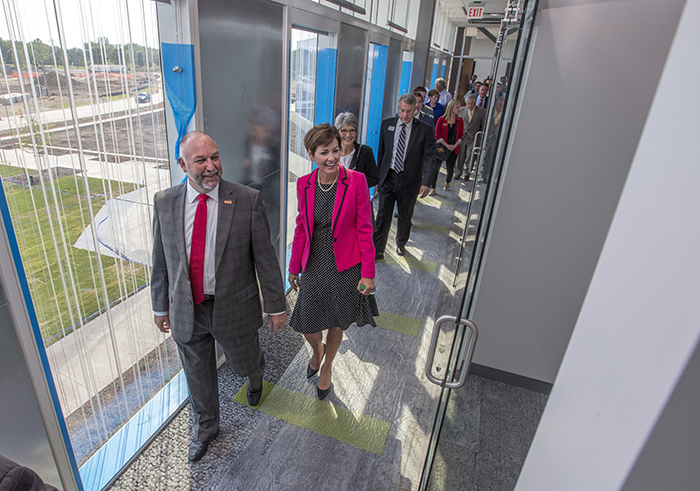
Photo by Christopher Gannon.
President Steven Leath, Iowa Lt. Gov. Kim Reynolds, members of the state Board of Regents and others received a first-look tour June 9 of the new Economic Development Core Facility on the south side of the ISU Research Park. The tour was part of grand-opening ceremonies for the 49,210-square-foot building that will house university offices that work with business and industry. A state appropriation of $12 million paid for construction of the building.
"This beautiful facility reflects the importance that Iowa State University and the state of Iowa place on economic development," said Michael Crum, vice president for economic development and business engagement.
Regent vote on proposed tuition increase set for July 18
Meeting last week on campus, the state Board of Regents took its first look at a $7.3 million addition to the 2016-17 Iowa State tuition rates it approved in December; a final decision will come on July 18, just five weeks before fall semester begins. The proposed increases include $300 for resident undergraduates, who previously were looking at a tuition freeze; $100 for nonresident undergraduates and all graduate students; and $50 for all veterinary medicine students. The summer adjustments come in response to an increase in state operating support for next year that was 27 percent of what university leaders sought.
Student leaders were invited to share comments with board members. ISU student government president Cole Staudt told them about specific students struggling to pay living expenses and stay in school, but he also said he doesn't blame the universities for seeking additional tuition revenue.
"We need the revenue this proposal will create," he said. "If we want a high-quality education with all the services our students expect, we have to work for it -- at the capitol." And he pledged to help deliver that message to legislators for the next budget cycle.
The increases the board approved in December and these summer increases would generate an estimated $33.7 million in new revenue in the fiscal year that begins July 1.
Iowa State leaders sought an $8.2 million increase to the university's general university operating appropriation for next year, but received $2.2 million in additional funds.
"None of us as regents like days like today," said board president Bruce Rastetter. "We know what [tuition increases] do to students and their families. This board is committed to accessibility, affordability and improving the quality of education, and sometimes we don't emphasize that third part as much as we ought to."
Rastetter also reminded his audience that the board has said repeatedly that savings realized from its TIER (Transparent, Inclusive Efficiency Review) initiative would be reinvested in the universities to improve the quality of programs -- "not to alter tuition."
Rastetter said he intends to support the proposed increases in the July vote. Calling the universities' spring deliberations "thoughtful," he concluded, "We have a responsibility to make sure that the quality at these institutions does not slip backward."
TIER update: Academic business cases
The board received a progress report on the three academic business cases in the TIER efficiency project from campus coordinators. University professor of agricultural and biosystems engineering Steve Freeman fills that role at Iowa State.
Case 1: Grow distance learning opportunities
This fall semester, the three universities will pilot a two-year online course-sharing project. Students at any school can access any of 15 courses offered through this initiative. Iowa State's slate of offerings is:
- CPRE 530, Network Protocols and Security
- NREM 120, Introduction to Renewable Resources
- FSHN 342, World Food Issues
- HDFS 102, Individual and Family Life Development
- HDFS 283, Personal and Family Finance
A sixth, AER E 261, Introduction to Aircraft Performance and Design, will be offered in conjunction with a University of Iowa course on unmanned aircraft systems. Course sharing and cross-enrollment among the schools are not new, but participation has been modest. In this pilot program, the universities are trying to make enrollment seamless. Students enroll in "placeholder" courses at their home university so billing and financial aid stay local, but their academic advisers will enroll them in the actual course.
A primary audience is students already taking online courses so logging into a different online course management system isn't an impediment.
Case 2: Use classroom and lab spaces more efficiently
Freeman told board members that Iowa State's course availability group has worked effectively for years with the room scheduling staff and developed its own model to ensure courses have enough seats to meet student demand, even with increasing enrollments. That model was refined this spring to improve the accuracy of projections more than one year out. ISU also is bringing new classrooms online, remodeling existing spaces so they're more flexible and meet current demands and expanding campus online testing centers to meet student demands for that service. Lastly, he said new student information software puts more information on one platform for better efficiency.
Case 3: Enrollment management (improve retention and four- and six-year graduation rates)
Freeman told the board there are many initiatives around campus, but focused his update on two examples:
- ISU completed a one-year pilot using predictive analysis of data to better advise students. Starting this fall, the predictive analytics software will be available to all academic advisers on campus.
- Iowa State is expanding its involvement with the University Innovation Alliance, 11 research universities working and learning together how to improve retention and graduation rates for low-income students and first-generation college students. The alliance received a first-in-the-world U.S. Department of Education grant to track entering students for four years to demonstrate the use of predictive analytics to encourage student success.
TIER update: Procurement business case
Mark Braun, the board's chief operating officer, reported that the Huron consulting group, which since last fall has been assisting the universities' purchasing departments with technology recommendations and vendor contract negotiations, has completed its work in four commodity areas: office supplies, computers, computer peripherals and food. Huron's work on three remaining commodity areas (scientific supplies, janitorial supplies, and maintenance, repair and operations) should be completed around Jan. 1, Braun said.
Successor to TIER
Noting the accomplishments and efficiencies found in 2.5 years of the TIER initiative, Regent Larry McKibben said the board and regent institutions "need to be diligent in our continuous quality improvement" and announced CQI as the "next generation" to TIER. The savings will be reinvested back into the schools.
Policies that impact university business
Braun also reported on an extensive rewrite of the board's policy manual. The proposed changes collapse the manual from 11 chapters to four and eliminate both duplication with or inconsistencies with other policy documents or recommendations, including Iowa Code, other state of Iowa departments and national higher education practices. Several proposed changes that impact business at Iowa State include:
- Raise the bid threshold for purchases from $25,000 to $50,000
- Raise the threshold requiring board permission to begin construction project planning from $2 million to $5 million. (Project budget still comes to the board, but initial request to begin wouldn't be needed for projects under $5 million.)
- Raise the threshold requiring board approval of construction schematic designs from $1 million to $2 million
Footnotes on 50 years
He's worked on campus for a half century. He's been involved in everything from selling a television station to deciding whether the blizzard warrants a snow day. We think we know Warren Madden pretty well. Or do we? Here are a few snapshots from the legendary senior VP, who will retire at the end of the month.

1961 Bomb
Why Iowa State?
Madden and his high school buddy both wanted to be engineers. The friend's father recommended his alma mater, Iowa State, and the Chicago-area youths liked the idea of getting a little farther from home than Urbana-Champaign. They arrived on campus in the fall of 1957, and Madden received his degree in industrial engineering four years later.
Some breakfasts can be too interesting
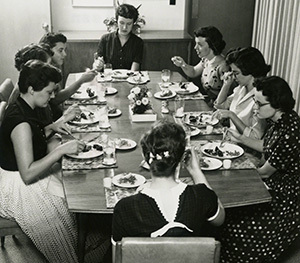
The Maddens spent a year in an ISU home management home similar to this one. Photo from University Archives.
During his final two undergrad quarters (1960-61), Madden lived in the home management house with his spouse Bev, the residence adviser, and eight home economics seniors enrolled in the capstone course that included planning and cooking meals. The young cooks disliked serving the same thing twice, and once they had run through eggs and other typical breakfast fare, they started preparing cream cheese dishes and "more interesting things." Madden soon decided to permanently skip the morning sit-down and start his day in their basement apartment with cereal and toast.
Career path
With a newly minted ISU degree, Madden took a job with Minnesota Mining and Manufacturing, later to become 3M. The job carried him from the Twin Cities to Pennsylvania and then to the Chicago area, where he fit an MBA from the University of Chicago (1965) into his busy routine. He'd been accepted into law school in 1966 when a call came from one of his former Iowa State mentors -- Wayne Moore, vice president for business and finance -- who persuaded Madden to take the university's contracts and grants officer post. Madden returned for what he anticipated would be a two-year stint.
Break time, in the vault
Visitors to the treasurer's office in Beardshear still can catch a glimpse, in the corner, of the old walk-in vault -- a relic of a time when many students paid tuition and fees in cash. In addition to cash, the vault held other valuables in the mid-60s, such as the home economics college's silver serving pieces, and treasurer's office staff ... on break.
"That's where we went to drink coffee and solve all the problems," Madden said.
Vault halt
In 1988, during treasurer Joan Piscitello’s first week on the job, she confronted a half-dozen or so coffee drinkers in the vault.
"What are you doing in here?" she asked, then invited the group to her office instead. She didn’t realize her boss (Madden), who was away that day, was a regular among the vault crowd.
Iowa Staters who shaped him

Parks

Hamilton

Moore
Across five decades and seven presidencies, Madden said he feels fortunate to have worked with and for lots of special people. "I've had great mentors, great relationships. I was part of what I think was a very unique administrative team in those early years. People like [vice presidents] Wayne Moore and Carl Hamilton were great people and mentors. Carl would give you pretty good advice."
He said all the presidents he worked for were "the right person for Iowa State at the point in time they were serving.
"Certainly, people like President [Robert] Parks I owe more to. He gave me the chance to become a vice president," Madden noted.
Special places
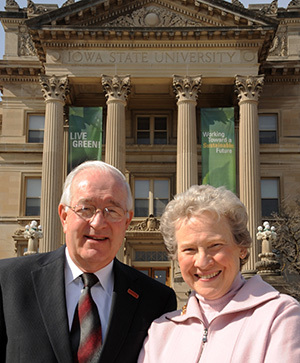
Warren and Beverly Madden
Madden's favorite spots on campus are the campanile ("I'm probably one of the few people I know who've campaniled both under the campanile and at the top") and Beardshear Hall ("I've had an office in that building for 50 years.").
In the early 2000s, the Maddens donated a large portion of the funds that lent the glow (gold leaf) to the dome of the Beardshear rotunda. "I get to walk into that building everyday. I get to see that rotunda. And every fall, I see this mass of new freshmen coming in, getting their ID cards."
Helping illegal parkers succeed
When a former Iowa State Daily sports writer, who'd racked up about a thousand dollars in parking fines, realized he couldn't register for fall classes unless he cleared the debt, "he and I worked out a deal," Madden said.
"He'd paint light poles for the summer. Each pole was about 50 bucks of his fine. We gave him a ladder, a bucket of paint and a brush, and every afternoon, through most of July, he was out painting. You get satisfaction out of seeing students learn some lessons and go on to success."
A few red ties in Kinnick
While Madden is a constant fan at Cyclone home events, one of his favorite athletic memories comes from the Hawkeyes' Kinnick Stadium in the fall of 1998. President Martin Jischke and he were invited to watch the game from the president's box in the stadium press tower.
"There were maybe three or four of us who were Iowa State fans in that mass of football fans," he recalled. "It was becoming increasingly clear as the game went on that Iowa State was going to win. It was the first time in 16 years Iowa State beat Iowa in football." [The Cyclones prevailed 27-9 and launched a string of five consecutive victories.]
Retirement reception
- 4-7 p.m., Friday, June 24, Scheman Building
- Program at 4 p.m., Benton Auditorium
- Reception follows, Brunnier Art Museum and 2nd floor lobby
At work in aisle four
As a 3M employee in his early years, Madden worked in one Chicago area suburb and lived in another 20 miles away. His personal and professional lives were separate. In Ames, those lives are inextricably linked.
"I kid people, but I'm being partly serious, that I get half my work done on Sunday mornings in grocery store aisles, because the reality is you see people, you talk with people and you interact.
"My worlds do collide and Bev and I have enjoyed that. We show up at lots of community events. Is that work or is it social or is it entertainment? It's a little bit of all of the above and, for us, it's been a great fit."
Navigating a gray world
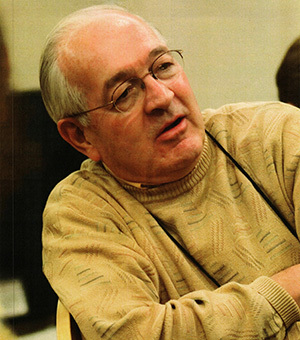
Madden, in a familiar pose
Besides guidance from thoughtful, generous mentors, Madden credits his success and longevity to accepting that the world is not all black or white. "There's a lot of gray and, overall, I've been able to work in a gray world fairly well.
"Most of the issues you have, there's usually more than one way to deal with them, so you try and figure out the best way. All my decisions probably haven't been the right ones," he said.
"I try to not internalize things and go on. One of the things I've probably done a fairly good job of in my 50 years is to continue to adapt and accommodate."
Observing from off campus
Madden shared this message with Iowa State faculty and staff: "This is a great university with great faculty, staff and great students. Iowa State is a very special place, and I hope they get to experience many of the kinds of circumstances Bev and I have over this long period of time.
"We plan to stay in Ames and be engaged. So I hope to be able to watch Iowa State continue to evolve, develop and grow."
Related stories
Save the date, April 28, 2016
Cyclone nation ovation, Feb. 4, 2016
Board accepts Des Moines higher ed report
A downtown location received the highest rating as a place for Iowa's regent universities to provide degree and certificate opportunities in a Des Moines metro area higher education needs assessment completed by consultants for the state Board of Regents. Factoring variables such as accessibility, visibility, anticipated startup and operating costs, potential for expansion and others, a West Des Moines location rated second and the AIB campus south of downtown Des Moines rated third.
Ray Thompson, vice president of higher education services for MGT of America, presented a final report to the board at its June 9 meeting. The board hired MGT of America last fall for $91,000 to complete the needs assessment. Pressed by board members about the AIB campus, which has been gifted to the University of Iowa, Thompson said it is an acceptable location. The report acknowledges concerns about dated infrastructure, its distance from downtown and safety/security, but that of all the options it is "ready to host students quickly."
Board president Bruce Rastetter suggested that the AIB site might work for "a couple of years as we get started."
President Steven Leath said Iowa State is committed to a regent-wide effort to address unmet educational needs in the larger Des Moines area. He also noted his past reservations about the quality and location of the AIB site, but said "we want to be involved."
Thompson said working adults "who are time- and place-bound" are the primary audience for regent university expansion in Des Moines, though that would vary some by academic discipline, location selected and course delivery format. High school and community college graduates are a secondary audience. Affordability and convenience for students are keys to success for any initiative, he said.
Thompson said the assessment identified needs for bachelor's and graduate degrees as well as certification and customized programs. He said there's an underserved need for bachelor's programs that prepare students for entry-level jobs in business, finance, accounting, human resources, financial management, data analytics, IT systems (including programming), civil and industrial engineering, teaching (particularly middle school and special education), agricultural science, and health and medical service management.
He said there's an underserved need for master's programs in business administration, finance, education administration (school district level), mental health counseling, and some health professions (nursing, occupational therapy).
The board voted 8-0 to accept the final report, but didn't discuss what they'll do with it.
Student financial aid
The following tables are compiled from university annual reports to the board on student financial aid.
Undergraduates: Who receives financial aid?
|
|
2014-15 |
2012-13 |
2010-11 |
|
Iowa residents |
|
|
|
|
Total students |
19,285 |
17,050 |
16,084 |
|
Received aid |
16,247 (84%) |
15,025 (88%) |
14,201 (88%) |
|
Nonresidents |
|
|
|
|
Total students |
10,749 |
8,503 |
7,020 |
|
Received aid |
8,091 (75%) |
6,588 (76%) |
5,413 (77%) |
Undergraduates: Who has debt at graduation?
|
|
2014-15 |
2012-13 |
2010-11 |
|
Iowa residents |
74% |
73% |
75% |
|
Nonresidents |
49% |
45% |
53% |
|
All undergraduates |
66% |
65% |
70% |
Undergraduates: Size of debt for those graduating with debt
|
|
2014-15 |
2012-13 |
2010-11 |
|
Average total debt |
|
|
|
|
All undergraduates |
$27,070 |
$29,458 |
$29,324 |
|
Iowa residents |
$25,831 |
$28,787 |
$29,035 |
|
Nonresidents |
$31,081 |
$32,078 |
$30,603 |
|
Average need-based debt |
|
|
|
|
All undergraduates |
$13,171 |
$13,844 |
$13,615 |
|
Iowa residents |
$13,023 |
$13,876 |
$13,670 |
|
Non residents |
$13,673 |
$13,713 |
$13,353 |
More ISU news
In other business, the board:
- Received a summary from Leath on three campus safety initiatives, including campus police officers piloting the use of body cameras this year. Leath said all uniformed officers will wear them while on duty, and activate them during law enforcing actions.
- Approved proposed salary parameters for faculty, P&S staff, contract staff (K base) and post docs for the fiscal year that begins July 1. Merit employees are covered by the terms of a two-year contract between the state and the American Federation of State, County and Municipal Employees.
- Approved appointments for Laura Dunn Jolly (Human Sciences dean), Kate Gregory (senior vice president for university services) and Michael Norton (university counsel); and altered assignments/titles for Jim Kurtenbach (vice president of IT services/chief information officer), Miles Lackey (chief financial officer/chief of staff) and Joe Murphy (assistant VP for government relations).
- Completed performance evaluations for the university presidents but did not announce any decisions on compensation adjustments.
- Appointed University of Northern Iowa provost Jim Wohlpart to serve as interim president of the university, effective July 3, and directed the board's executive director Robert Donley to meet with key constituent groups and develop a timeline for a presidential search. President William Ruud departs next month to become president of Marietta College, Ohio.
- Approved a five-year lease ($1,000 annually) between Iowa State and Clearwater Crossing Lodge Inc. (a subsidiary of the ISU Foundation) for a 29-acre rural property west of Missoula, Montana, for use by the colleges of Human Sciences and Agriculture and Life Sciences. The property contains cabins, a small restaurant and various outbuildings suitable for student learning experiences. The Clearwater corporation is in the process of dissolving and gifted all of its shares to the ISU Foundation, which subsequently will become the landlord on the lease.
- Approved the terms of a trust that will allow Iowa State to benefit from the gift of 389 acres (two parcels) of farmland in Worth County from Lavonne Gregory upon her death. As stipulated in her revocable trust agreement, the state would receive the land and the university would manage the farm, with net income to be split between the colleges of Agriculture and Life Sciences and Veterinary Medicine and used in teaching and research related to companion animals.
- Approved a revised budget ($6.1 million) for the kinesiology department's renovation project in the older part of the Forker Building. The $570,000 increase is due to a redesign of the work area for graduate students.
- Approved the termination of the (inactive) Institute for Combinatorial Discovery, effective June 30.
- Approved Iowa State's request to replace the University of Arizona with Pennsylvania State University in its peer 11 group.
Body cameras among campus safety initiatives
At the June 9 state Board of Regents meeting, President Steven Leath announced three initiatives to enhance campus safety.
Body camera pilot
The first is development of a comprehensive body camera policy by ISU police. It will require all uniformed police officers to wear body cameras while on duty. The cameras are activated during calls for service and other law enforcement action, and capture audio and video of these public interactions.
Police recently purchased body-worn cameras to outfit officers. Officers are testing the cameras now in a pilot phase.
Interim police chief Aaron DeLashmutt said the goal is to create greater transparency and accountability between police and community members. Use of body cameras will strengthen community trust, quickly resolve complaints and provide valuable evidence for prosecutors, DeLashmutt noted.
Safety escort app
Second, ISU police is in the process of launching a new mobile app, enabling students, faculty, staff and visitors to request a safety escort via their smartphones. Requests have more than tripled over the past decade to more than 6,300 requests last year. The new app, ready for launch this fall, will ensure greater accuracy in pick-up locations and allow riders to track the escort’s arrival time.
Multicultural liaison
The third initiative is expansion of the police's multicultural liaison officer program, which provides outreach to underrepresented students, faculty and staff. Officers Dwight Hinson, Natasha Greene and Nick Grossman will continue the work they began last spring by hosting meet-and-greet opportunities around campus, providing an educational initiative on hate crimes, and inviting the community to get better acquainted with the department through other fun, social activities.
Related story:
Safety escort app may debut this fall, April 21, 2016
Stop and smell the roses
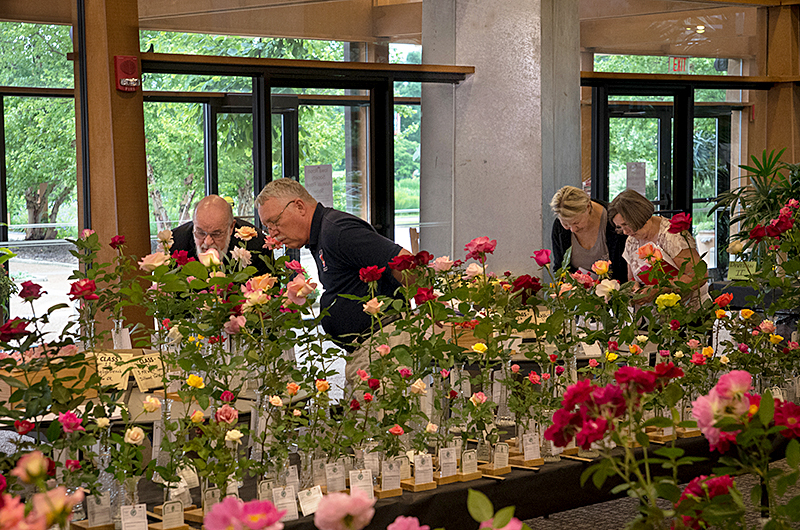
The Iowa Rose Society's annual show will fill the garden room at Reiman Gardens on Saturday, June 18 (9 a.m.-4 p.m.). The entries, featuring a myriad of varieties, will be open to viewing by the public, with judging at 1 p.m.
Rose craft stations will be set up for children from noon to 2 p.m., and live music, featuring the Heart of Iowa classical guitar society, will entertain visitors from 1:30 to 3 p.m. Look for a peacock made of roses, created by Reiman Gardens horticulturist Ed Moran.
Gardens admission is free for members, ISU students and children three and younger. Public admission is $8 ($7 for seniors and $4 for youth). Contributed photo.
Visitors keep campus busy during summer
Many events -- from local to global -- will bring thousands of visitors to campus this summer. The following is a look at the groups (expecting 100 or more participants) that Iowa State will welcome over the next couple months.
